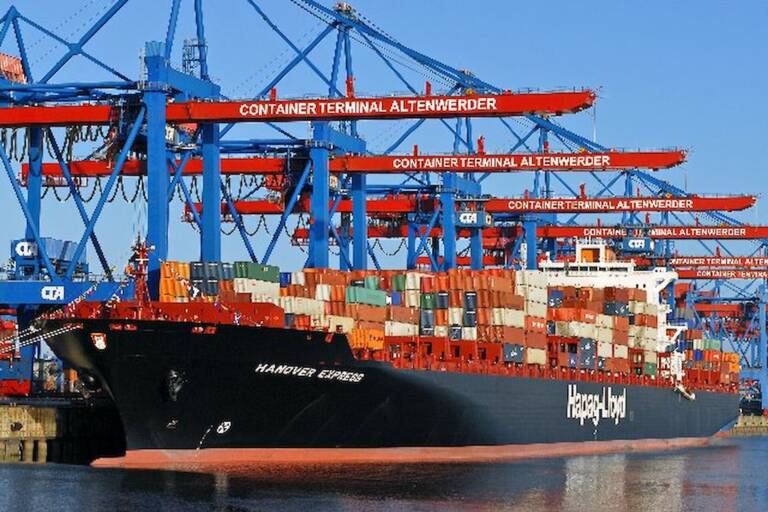The CBAM starts: new taxes on imports into the EU from 2026

The EU's Carbon Border Adjustment Mechanism (CBAM), commonly known as the “carbon border tax”, launched on 1 October in the first transitional phase for imports of several groups of carbon-intensive products into the European Union.
The first phase of EU carbon import pricing legislation will not impose taxes on products, but will carry out observations. The actual taxes will apply starting from 2026, unless obviously there are no changes in the meantime.
Importers of iron and steel, cement, aluminium, fertilisers, hydrogen and electricity in the EU will, from now on, be asked to report on the volume of their imports and the greenhouse gas (GHG) emissions generated during their production, including if at this stage they will not pay any financial adjustment.
How the border tax mechanism works
From 2026, EU importers and non-EU exporters will have to pay a tax on product-related emissions, as European producers currently do under the EU emissions trading scheme.
The carbon border tax, CBAM, is part of the EU's emissions reduction target to reduce net greenhouse gas emissions by at least 55% by 2030, compared to 1990 levels. According to the EU, the Carbon border tax will also have a dual purpose: maintaining European industrial competitiveness and encouraging other countries to adopt greener policies and faster decarbonisation of industries.
“The CBAM is a WTO-compliant measure that encourages global industry to embrace greener and more sustainable technologies,” says the European Commission.
Imports could be at least partially exempt from levies when the tax takes effect in 2026 if the country of origin has an emissions trading system or other carbon policies similar to those in the EU.
What will change
The EU's carbon border tax is expected to drive sharp increases in both material commodity prices and consumer prices, burden EU importers and non-EU exporters with additional reporting and bureaucracy, and potentially change the Global trade flows in metals and other materials, analysts say.
Numerous EU trading partners have already criticized the bloc for green protectionism. The United States, China, India, Brazil, South Africa and many other countries have expressed concern that the new rules will further complicate trade and raise export costs for non-EU producers, strategists at ING Warren Patterson and Ewa Manthey. this year.
“The first and most obvious impact of the implementation of CBAM is that European consumers will face higher prices,” they said, adding that CBAM-related reporting requirements will also increase costs, which will likely also be passed on to consumers .
The financial impact of the carbon border tax could be significant for EU imports, the Boston Consulting Group estimated last year.
According to a BCG analysis, by 2032, the cost of iron and steel imported into the EU from the United States and the United Kingdom could increase by 6%, from Turkey by 10%, from South Korea by 12%, from China by 17% and India by a massive 32%. All costs that will fall on European consumers.
“The downstream impact could fall most heavily on the automotive, construction, packaging and appliance industries, the largest users of CBAM products. For example, a European construction company importing 100 tonnes of Indian steel would pay CBAM costs of 24,600 euros, or 32% of the current price,” BCG said.
For example, India's position as a leading producer of low-cost aluminum could be severely compromised due to its higher emissions intensity compared to its European counterparts. If sustainability and emissions reduction measures are not implemented soon, Indian exports to the EU will become much more expensive.
“Low-emitting producers are likely to increase their share of exports to the EU, given the lower CBAM burden they would face, while larger carbon emitters will likely seek markets where their high emissions intensity will not be penalized” , said ING.
A tornado of administrative costs for companies
The border tax is expected to raise the prices of goods and lead to changes in purchasing choices, the Conference Board , a global think tank and business association, said in research last week.
Not only will consumers face higher prices. Businesses will also be burdened with administrative costs for reporting and verifying emissions, costs that they may later pass on to consumers. According to the Conference Board, the EU customs system also faces additional bureaucracy and controls.
European members of the Conference Board were interviewed about how they expect the Carbon Border Tax will impact their businesses. A total of 83% of respondents, primarily senior procurement and sustainability executives, expect prices to increase and 75% expect CBAM to influence their purchasing choices in the future.
According to the think tank, current attempts to ease administrative burdens will likely fail.
“Without rapid action to address the administrative problems that importers will begin to face from next week, there is a risk that the CBAM will act as a drag on the European economy,” said Anuj Saush last week, leader of the European ESG Center at the Conference Board.
Europe will therefore see a new inflationary push, with an impoverishment of its citizens, and its companies will be pushed even further to the margins of world trade. A great result actively sought by the Commission and its "Ambitious" objectives, a term that must be read as a withdrawal from the wallets of European citizens.

Thanks to our Telegram channel you can stay updated on the publication of new Economic Scenarios articles.
The article CBAM starts: new taxes on imports into the EU from 2026 comes from Economic Scenarios .
This is a machine translation of a post published on Scenari Economici at the URL https://scenarieconomici.it/parte-il-cbam-dal-2026-nuove-tasse-sulle-importazioni-nella-ue/ on Wed, 04 Oct 2023 11:28:17 +0000.
